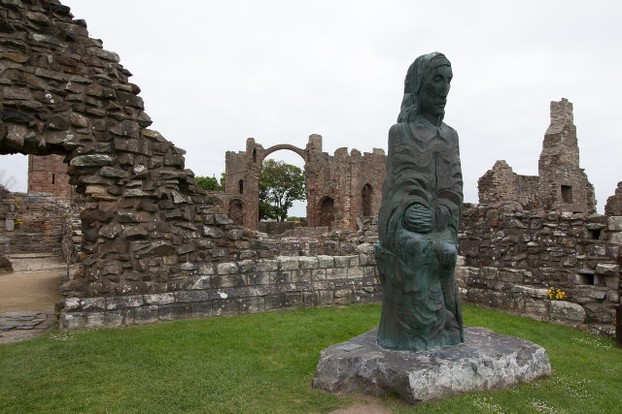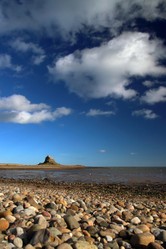The bones of St Cuthbert survived the Vikings and even Henry the Eighth, England's greatest vandal, for when Henry's commissioners forced open the nearly one thousand year old coffin they found the saint's body to be incorrupt. Disturbed, the narrow-minded zealots played safe and had the corpse re-interred. Cuthbert's body has decayed now, but the coffin [a replacement] is still at Durham Cathedral. People still visit sites associated with this extremely holy man of God to somehow benefit from the lingering aura of sanctity which pervades such places. Cuthbert was a monk and at times hermit, dwelling at the end of his life alone on a rocky island in the tiny archipelago known as the Farne Islands off the coast of Northumberland, England's most north-easterly county.
The author comes from a family long-established in the English and Scottish borders and is a much-published author of historical works on the borderland between the two often unfriendly neighbours, England and Scotland [he is Scottish]. At the age of sixty eight and not being in the best of health, he decided to take stock of his life as he moves into his twilight years. His method of taking stock was to follow the journeys of the local saint, the spiritual master St Cuthbert, from his birth to his final earthly destination on Lindisfarne and the Farne Islands. The journey consists of a number of short walks in the Tweed Valley, where he lives and where Cuthbert lived much of his life, but the personal journey is interwoven with historical accounts and reflections on the oft-bloodstained history of the struggles between English and Scots [in which both sides are equally guilty, no goodies here]. He also interweaves the journey with an insight into what seems like the spiritual struggle of a lapsed Christian who still treasures much in his religious heritage.
The religious struggle recounted in this book is an ever-present background to the text, but it is dealt with in a sensitive and respectful way, and this gives an inspiring element to the text and to me, a religious writer, an insight into the way in which belief and disbelief work in a struggling human mind. I am particularly sympathetic with his account of attending the Calvinist church of Scotland as a teenager, where a traditional hell-fire preacher assailed the congregation with threats of fire and damnation, which led to Moffat's exit from the church.
The main text [minus epilogue] concludes with a stay on Lindisfarne, where he tries and to some extent seek what he calls the peace of Cuthbert and come to terms with his mortality. This section of the book gives an insight into life on an island of pilgrimage, a sacred spot treasured by many in Britain . It is well worth reading, but do not think there is a dramatic conversion, there is not, but we can detect positive changes in the author's mental state. Perhaps massive changes are too much to be expected, and small, incremental changes are what happens in most lives.






 Pilgrimage. A review15 days ago
Pilgrimage. A review15 days ago
 Leo the Fourteenthon 05/09/2025
Leo the Fourteenthon 05/09/2025
 The Melsonby Hoardon 03/25/2025
The Melsonby Hoardon 03/25/2025



Comments
It depends onnthevcountry you are in. In Northern Eng,land it is likely to from the siX ..hundreds.
Thank you!
The second paragraph to the second subheading indicates that "The author is sensitive to place and its spirituality, and herein he reveals his religious thoughts. He rightly identifies the location of early Christian sites with pre-Christian religious features, such as standing stones, and he dwells on the intrinsic spirituality of certain places."
What is the oldest early Christian site?
Much of it is. I don't know if there is a memorial there.
Thank you!
The second paragraph to the first subheading, Of Lindisfarne and Cuthbert, indicates that "The journey consists of a number of short walks in the Tweed Valley, where he lives and where Cuthbert lived much of his life."
Is the Tweed Valley contained within the modern-day Tweed Valley Forest Park?
If so, might there be some memorial to St. Cuthbert there?
It might think this, but it is not certain.
Thank you!
There's a Buddhist tradition of considering the ashes of the cremated Buddha and of the cremated Buddhist holy persons -- with their apparel and their pyre -- as holy relics.
Might the Church consider coffin ashes as holy relics or might such ashes be re-purposed, perhaps as fertilizer on consecrated ground?
The old coffins would have been burnt.
The first paragraph to the first subheading, Of Lindisfarne and Cuthbert, alerts us to the Cuthbert coffin as being a replacement of the original.
What is done when one container no longer is deemed capable of storing holy bones and relics?
Would the Cuthbert coffin have been used and the ashes re-purposed or scattered on consecrated ground?
I think that the interest in setting the
Hound of Heaven to music was posthumous.
The last sentence in the second paragraph to your subheading Lindisfarne includes a reference to The Hound of Heaven poem by Francis Thompson.
The Wikipedia article on that poem references musical settings by William Henry Harris in 1919, Humphrey John Stewart in 1924, Miriam Gideon in 1945, Maurice Jacobson in 1953, Howard Blake in 1980 and Ronald Corp in 2009.
Was the poet -- who died in 1907, 12 years before the first setting -- aware of interest in his poem being set to music or was that something that came about posthumously, without any obvious indication before?